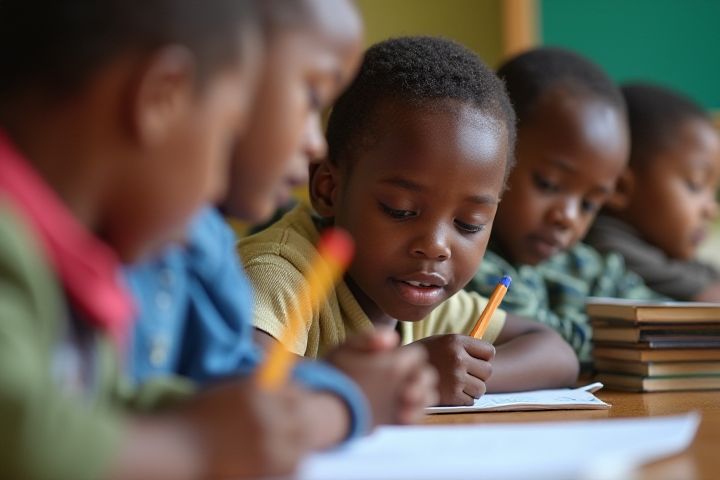
Child education in Nigeria faces significant challenges, including inadequate infrastructure, insufficient funding, and cultural barriers that hinder access. The literacy rate among children varies widely across regions, with urban areas often having better resources compared to rural locations. Organizations, both governmental and non-governmental, strive to improve educational outcomes by implementing innovative programs and strategies to engage communities and parents. Primary education is emphasized, being critical for future academic success, and efforts are being made to address educational disparities among genders and socioeconomic classes. Investing in child education can lead to long-term benefits, including enhanced economic growth and a more informed citizenry for Nigeria's development.
Universal Basic Education implementation
Child education in Nigeria significantly emphasizes the implementation of the Universal Basic Education (UBE) program, designed to provide free and compulsory education for children aged 6 to 15 years. This initiative aims to eradicate illiteracy and ensure that every child has access to quality learning opportunities, promoting both academic knowledge and essential life skills. The UBE program also addresses gender disparities in education, encouraging equal participation of girls and boys in schools across various regions. With the collaboration of federal and state governments, non-governmental organizations, and local communities, Nigeria continues to strive for improved educational outcomes and sustainable development in child education.
High student-teacher ratio
In Nigeria, the education system faces challenges such as a high student-teacher ratio, often exceeding 50:1 in many regions. This overcrowding hampers individual attention, affecting student engagement and learning outcomes significantly. To enhance educational quality, initiatives are being implemented to recruit more qualified teachers and improve teaching conditions. You can contribute to this effort by supporting local educational organizations that aim to reduce this ratio and promote better learning environments for children.
Regional disparity in educational access
In Nigeria, regional disparities in educational access significantly impact child education, with northern states facing greater challenges due to factors like poverty and insufficient infrastructure. This inequality leads to lower enrollment rates, particularly for girls, who experience additional cultural barriers to education. Urban areas show higher levels of educational investment compared to rural regions, exacerbating the gap in learning opportunities. Addressing these disparities requires targeted policies that promote equitable resource distribution and emphasize community involvement in education.
Role of private schools
In Nigeria, private schools play a crucial role in the education landscape, catering to diverse socioeconomic segments. These institutions often provide innovative teaching methods, smaller class sizes, and specialized curricula that can enhance student engagement and learning outcomes. With a growing number of parents seeking quality education for their children, private schools have become increasingly popular, sometimes outperforming public counterparts in academic achievements and extracurricular activities. As you consider educational options for your child, understanding the value and offerings of private schools in Nigeria becomes essential for making informed decisions.
Gender disparities in enrollment
In Nigeria, gender disparities in enrollment present a significant challenge in child education, with a noticeable gap between boys and girls in various regions. Societal norms and economic factors often hinder girls' access to primary and secondary education, leading to fewer opportunities for personal and professional growth. This inequity contributes to broader issues, such as higher rates of child marriage and lower female literacy levels, which perpetuate cycles of poverty. Addressing these disparities requires targeted policies and community engagement to promote gender equality in educational access and retention.
Impact of socio-economic factors
Child education in Nigeria is significantly influenced by various socio-economic factors, including family income, parental education levels, and geographic location. Families with lower income often face barriers in accessing quality education, leading to high dropout rates and limited educational resources. Furthermore, areas with inadequate infrastructure and a lack of trained teachers exacerbate educational disparities between urban and rural settings. Understanding these socio-economic determinants is crucial for implementing policies that promote equitable access to education for all Nigerian children, empowering them to reach their full potential.
Curriculum development and reform
Child education in Nigeria emphasizes curriculum development and reform to enhance learning outcomes and ensure relevance in a rapidly changing society. The Nigerian government has introduced various educational policies aimed at updating the curriculum to foster critical thinking, creativity, and practical skills among students. Additionally, innovative teaching methodologies and digital resources are being integrated into classrooms to engage learners more effectively. You can explore how these reforms address regional disparities and aim to provide equitable access to quality education for all children in Nigeria.
Government policies and initiatives
Child education in Nigeria is greatly influenced by government policies and initiatives aimed at improving access to quality learning. The Universal Basic Education (UBE) program mandates free, compulsory primary education for all children, working to eradicate literacy disparities across regions. Recent initiatives, such as the National Policy on Education, emphasize inclusive education, integrating marginalized groups like girls and children with disabilities into mainstream schooling. Your engagement in these policies can significantly impact educational outcomes, contributing to a more equitable future for Nigeria's youth.
Influence of cultural and religious beliefs
Child education in Nigeria is profoundly shaped by the diverse cultural and religious beliefs that permeate the society. Many communities prioritize traditional teachings that instill moral values, while others emphasize formal education as a means of economic mobility. Religious institutions often play a pivotal role in educational initiatives, with Islamic and Christian schools providing unique curriculums that reflect their respective beliefs. Understanding these cultural dynamics is essential for developing effective educational policies that cater to the unique needs of Nigerian children.
Challenges of infrastructure and resources
Child education in Nigeria faces significant challenges stemming from inadequate infrastructure and limited resources. Many schools lack basic facilities such as classrooms, clean water, and sanitation, which severely hampers the learning process. Additionally, insufficient teaching materials and qualified educators contribute to a declining quality of education, particularly in rural areas. Addressing these issues is essential for fostering an environment where every child can thrive academically and reach their full potential.
